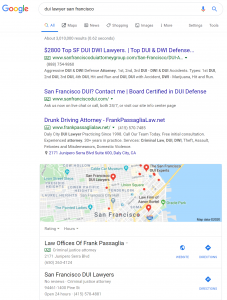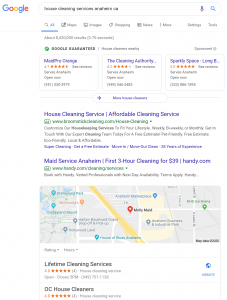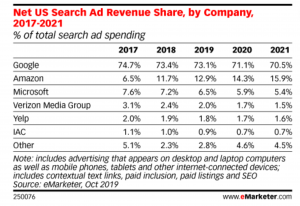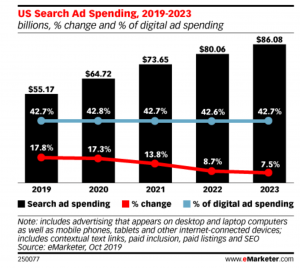Mockingbird manages millions of dollars in lawyer advertising across hundreds of law firms and while overall performance varies, firm to firm, I thought it might be useful to share our conversion rate data so my readers could benchmark their own performance. First – understand that conversion rate here does NOT mean converting into clients, but instead the percentage of people who contact the firm by phone, form fill, chat or even text message after clicking on the advertisement. One of the patterns we are aware of is that conversion rates vary greatly by Practice Area, so I’ve broken different practice areas out below. I’m hoping the numbers below are helpful in evaluating the performance of your own advertising…and if you agency obfuscates or doesn’t report on these numbers, I’d ask myself what they are hiding (read below the bullets for more…)
Also note that our campaigns’ strategy and tactics are driven primarily by business metrics instead of traditional PPC marketing metrics (such as impressions or click through rates), these benchmark numbers are likely to be very different from PPC campaigns that focus on optimizing more typical metrics like impressions, CTR, or position.
-
- Personal Injury: 10.2%
- Criminal Defense: 10.8%
- Social Security Disability: 18.9%
- Bankruptcy: 8.8%
- Family: 20.2%
- Immigration: 32.3%
- Business: 1.6%
- Estate Planning: 12.4%
- Tax: 4.2%
- Employment: 17.1%
- Medical Malpractice: 31.0%
Tricks Agencies Use to Lie About Conversion Performance
Trick 1: Conflating Branded Results
Note that in our analysis above, we only did the analysis on non-branded search queries – i.e. “car accident lawyer” and not branded queries – i.e. “Smith and Jones Law Firm.” The reason for this is simple, branded queries already have high intent, and the marketing cost of those queries clearly doesn’t rest with the AdWords spend, but instead, TV, radio, billboards, and overall great customer service which drives referrals. In addition, clicks for branded queries are extremely uncompetitive relative to non branded queries and therefore cheaper, typically costing between 1% and 4% of typical PPC bids. One way online marketing agencies fool their clients is by including conversions from branded queries in their reporting – and taking credit for these very low costs clicks that drive business from marketing dollars spent on other marketing channels.
Trick 2: Hiding YOUR Data.
Agencies often literally hide conversion data from their clients by refusing access to either Google Ads or Google Analytics. If you can’t find your conversion data, perhaps it’s time to find a new agency that understands that it’s your data, not theirs.
Trick 3: Over-Counting Phone Calls
There are only 4 real “conversions” for legal marketing: phone calls, form fills, chat and text. One way agencies artificially inflate their “conversion” data is by counting every phone call (instead of first time callers only) to obfuscate the data behind poorly performing campaigns. Ensure your conversion reporting is set to only count first time callers, any moderately sophisticated dynamic call tracking service (like CallRail) has a simple setting to adjust for this.
It’s important to not only monitor the rate at which your advertising is converting into inquiries from potential clients, but also understand how this relates to industry standards. Benchmarking your conversion rate against competitors within your practice areas should allow you to identify strengths and weaknesses as well as shore up any deficiencies in bidding strategy, ad copy or landing pages that might be preventing you from maximizing your overall conversions.



